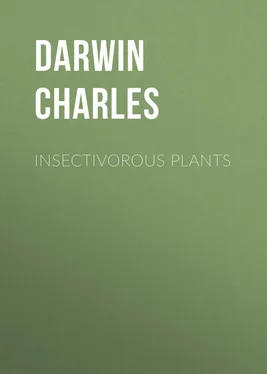Charles Darwin - Insectivorous Plants
Здесь есть возможность читать онлайн «Charles Darwin - Insectivorous Plants» — ознакомительный отрывок электронной книги совершенно бесплатно, а после прочтения отрывка купить полную версию. В некоторых случаях можно слушать аудио, скачать через торрент в формате fb2 и присутствует краткое содержание. Жанр: foreign_antique, foreign_prose, на английском языке. Описание произведения, (предисловие) а так же отзывы посетителей доступны на портале библиотеки ЛибКат.
- Название:Insectivorous Plants
- Автор:
- Жанр:
- Год:неизвестен
- ISBN:нет данных
- Рейтинг книги:5 / 5. Голосов: 1
-
Избранное:Добавить в избранное
- Отзывы:
-
Ваша оценка:
- 100
- 1
- 2
- 3
- 4
- 5
Insectivorous Plants: краткое содержание, описание и аннотация
Предлагаем к чтению аннотацию, описание, краткое содержание или предисловие (зависит от того, что написал сам автор книги «Insectivorous Plants»). Если вы не нашли необходимую информацию о книге — напишите в комментариях, мы постараемся отыскать её.
Insectivorous Plants — читать онлайн ознакомительный отрывок
Ниже представлен текст книги, разбитый по страницам. Система сохранения места последней прочитанной страницы, позволяет с удобством читать онлайн бесплатно книгу «Insectivorous Plants», без необходимости каждый раз заново искать на чём Вы остановились. Поставьте закладку, и сможете в любой момент перейти на страницу, на которой закончили чтение.
Интервал:
Закладка:
I also carefully removed the secretion from four glands with a sharply pointed piece of blotting-paper, so that they were exposed for a time naked to the air, but this caused no movement; yet these glands were in an efficient state, for after 24 hrs. had elapsed, they were tried with bits of meat, and all became quickly inflected. It then occurred to me that particles floating on the secretion would cast shadows on the glands, which might be sensitive to the interception of the light. Although this seemed highly improbable, as minute and thin splinters of colourless glass acted powerfully, nevertheless, after it was dark, I put on, by the aid of a single tallow candle, as quickly as possible, particles of cork and glass on the glands of a dozen tentacles, as well as some of meat on other glands, and covered them up so that not a ray of light could enter; but by the next morning, after an interval of 13 hrs., all the particles were carried to the centres of the leaves.
These negative results led me to try many more experiments, by placing particles on the surface of the drops of secretion, observing, as carefully as I could, whether they penetrated it and touched the surface of the glands. The secretion, from its weight, generally forms a thicker layer on the under than on the upper sides of the glands, whatever may be the position of the tentacles. Minute bits of dry cork, thread, blotting paper, and coal cinders were tried, such as those previously employed; and I now observed that they absorbed much more of the secretion, in the course of a few minutes, than I should have thought possible; and as they had been laid on the upper surface of the secretion, where it is thinnest, they were often drawn down, after a time, into contact with at least some one point of the gland. With respect to the minute splinters of glass and particles of hair, I observed that the secretion slowly spread itself a little over their surfaces, by which means they were likewise drawn downwards or sideways, and thus one end, or some minute prominence, often came to touch, sooner or later, the gland.
In the foregoing and following cases, it is probable that the vibrations, to which the furniture in every room is continually liable, aids in bringing the particles into contact with the glands. But as it was sometimes difficult, owing to the refraction of the secretion, to feel sure whether the particles were in contact, I tried the following experiment. Unusually minute particles of glass, hair, and cork, were gently placed on the drops round several glands, and very few of the tentacles moved. Those which were not affected were left for about half an hour, and the particles were then disturbed or tilted up several times with a fine needle under the microscope, the glands not being touched. And now in the course of a few minutes almost all the hitherto motionless tentacles began to move; and this, no doubt, was caused by one end or some prominence of the particles having come into contact with the surface of the glands. But as the particles were unusually minute, the movement was small.
Lastly, some dark blue glass pounded into fine splinters was used, in order that the points of the particles might be better distinguished when immersed in the secretion; and thirteen such particles were placed in contact with the depending and therefore thicker part of the drops round so many glands. Five of the tentacles began moving after an interval of a few minutes, and in these cases I clearly saw that the particles touched the lower surface of the gland. A sixth tentacle moved after 1 hr. 45 m., and the particle was now in contact with the gland, which was not the case at first. So it was with the seventh tentacle, but its movement did not begin until 3 hrs. 45 m. had elapsed. The remaining six tentacles never moved as long as they were observed; and the particles apparently never came into contact with the surfaces of the glands.
From these experiments we learn that particles not containing soluble matter, when placed on glands, often cause the tentacles to begin bending in the course of from one to five minutes; and that in such cases the particles have been from the first in contact with the surfaces of the glands. When the tentacles do not begin moving for a much longer time, namely, from half an hour to three or four hours, the particles have been slowly brought into contact with the glands, either by the secretion being absorbed by the particles or by its gradual spreading over them, together with its consequent quicker evaporation. When the tentacles do not move at all, the particles have never come into contact with the glands, or in some cases the tentacles may not have been in an active condition. In order to excite movement, it is indispensable that the particles should actually rest on the glands; for a touch once, twice, or even thrice repeated by any hard body is not sufficient to excite movement.
Another experiment, showing that extremely minute particles act on the glands when immersed in water, may here be given. A grain of sulphate of quinine was added to an ounce of water, which was not afterwards filtered; and on placing three leaves in ninety minims of this fluid, I was much surprised to find that all three leaves were greatly inflected in 15 m.; for I knew from previous trials that the solution does not act so quickly as this. It immediately occurred to me that the particles of the undissolved salt, which were so light as to float about, might have come into contact with the glands, and caused this rapid movement. Accordingly I added to some distilled water a pinch of a quite innocent substance, namely, precipitated carbonate of lime, which consists of an impalpable powder; I shook the mixture, and thus got a fluid like thin milk. Two leaves were immersed in it, and in 6 m. almost every tentacle was much inflected. I placed one of these leaves under the microscope, and saw innumerable atoms of lime adhering to the external surface of the secretion. Some, however, had penetrated it, and were lying on the surfaces of the glands; and no doubt it was these particles which caused the tentacles to bend. When a leaf is immersed in water, the secretion instantly swells much; and I presume that it is ruptured here and there, so that little eddies of water rush in. If so, we can understand how the atoms of chalk, which rested on the surfaces of the glands, had penetrated the secretion. Anyone who has rubbed precipitated chalk between his fingers will have perceived how excessively fine the powder is. No doubt there must be a limit, beyond which a particle would be too small to act on a gland; but what this limit is, I know not. I have often seen fibres and dust, which had fallen from the air, on the glands of plants kept in my room, and these never induced any movement; but then such particles lay on the surface of the secretion and never reached the gland itself.
Finally, it is an extraordinary fact that a little bit of soft thread, 1/50 of an inch in length and weighing 1/8197 of a grain, or of a human hair, 8/1000 of an inch in length and weighing only 1/78740 of a grain (.000822 milligramme), or particles of precipitated chalk, after resting for a short time on a gland, should induce some change in its cells, exciting them to transmit a motor impulse throughout the whole length of the pedicel, consisting of about twenty cells, to near its base, causing this part to bend, and the tentacle to sweep through an angle of above 180o. That the contents of the cells of the glands, and afterwards those of the pedicels, are affected in a plainly visible manner by the pressure of minute particles, we shall have abundant evidence when we treat of the aggregation of protoplasm. But the case is much more remarkable than as yet stated; for the particles are supported by the viscid and dense secretion; nevertheless, even smaller ones than those of which the measurements have been given, when brought by an insensibly slow movement, through the means above specified, into contact with the surface of a gland, act on it, and the tentacle bends. The pressure exerted by the particle of hair, weighing only 1/78740 of a grain and supported by a dense fluid, must have been inconceivably slight. We may conjecture that it could hardly have equalled the millionth of a grain; and we shall hereafter see that far less than the millionth of a grain of phosphate of ammonia in solution, when absorbed by a gland, acts on it and induces movement. A bit of hair, 1/50 of an inch in length, and therefore much larger than those used in the above experiments, was not perceived when placed on my tongue; and it is extremely doubtful whether any nerve in the human body, even if in an inflamed condition, would be in any way affected by such a particle supported in a dense fluid, and slowly brought into contact with the nerve. Yet the cells of the glands of Drosera are thus excited to transmit a motor impulse to a distant point, inducing movement. It appears to me that hardly any more remarkable fact than this has been observed in the vegetable kingdom.
Читать дальшеИнтервал:
Закладка:
Похожие книги на «Insectivorous Plants»
Представляем Вашему вниманию похожие книги на «Insectivorous Plants» списком для выбора. Мы отобрали схожую по названию и смыслу литературу в надежде предоставить читателям больше вариантов отыскать новые, интересные, ещё непрочитанные произведения.
Обсуждение, отзывы о книге «Insectivorous Plants» и просто собственные мнения читателей. Оставьте ваши комментарии, напишите, что Вы думаете о произведении, его смысле или главных героях. Укажите что конкретно понравилось, а что нет, и почему Вы так считаете.












